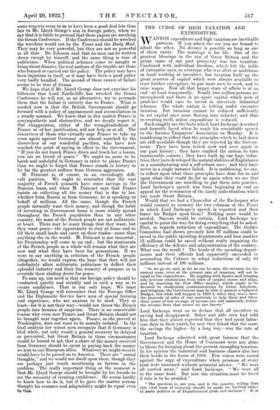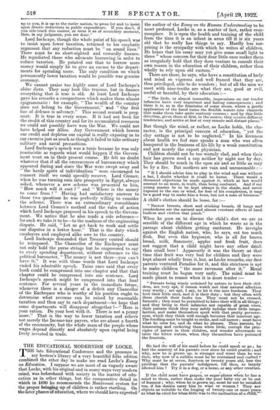THE CURSE OF HIGH TAXATION AND EXPENDITURE.
WANTON expenditure and high taxation are inevitable partners. If you admit the one you are bound to admit the other. No divorce is possible so long as one of them exists. The marriage is for life. One of the greatest blessings in the rise of Great Britain and the prime cause of our past prosperity was low taxation. Combined with individual freedom, which left the fields of enterprise open to everyone who was alert or ambitious or hard working or inventive, low taxation built up the great reserves of capital which were always available to start further enterprises, to put more men to work, and to raise wages. Now all that happy state of affairs is at an end—at least temporarily. Nearly two million persons are unemployed and there is no spare capital which men of prudence would care to invest in uncertain industrial schemes. The whole nation is wilting under excessive taxation. But taxation cannot be reduced sufficiently to set capital once more flowing into industry, and thus re-creating itself, unless expenditure is reduced.
Such roughly are the facts which Lord Inchcape described and honestly faced when he made his remarkable speech to the Income Taxpayers' Association on Monday. It is maddening to reflect that the principles which he laid down are still available though they are rejected by the Govern- ment. They have been tested over and over again in our past history ; they have enabled the nation to turn innumerable corners ; they have built up our huge indus- tries; they have developed the natural abilities of Englishmen as a manufacturing and a self-reliant race; and they have never in a single instance failed. It is maddening, we say, to reflect upon what these principles have done for us and upon what they could do for us again when we see that the Government are unwilling to put them into practice. Lord Inchcape's speech was from beginning to end an appeal for the restoration of the hardy individualism which has made Great Britain.
Would that we had a Chancellor of the Exchequer who would commit to memory the two columns of the Times in which Lord Inchcape's speech is reported and then frame his Budget upon them ! Nothing more would, be needed. Success would be certain, Lord Inchcape was careful to point the way for doing everything that he asked. First, as regards reduction of expenditure. The Geddes Committee had shown precisely how 87 millions could be saved in the public spending departments and how another 13 millions could be saved without really impairing the efficiency of the defence and administration of the country. What was the result ? The heads of the spending depart- ments and their officials had apparently succeeded in persuading the Cabinet to adopt reductions of only 04 millions instead of 100 millions.
" So we go on, and, as far as can be seen, the revenue for the current year, oven at the present rate of taxation, will not be equal to the expenditure. By juggling with figures and bringing into revenue realizations from sales of surplus stores and ships, and by annexing the Post Office surplus, which ought to be devoted to cheapening communications by letter, telephone, and telegram, the Government may be able to present a balanced Budget, but what will happen in 1923-4, when they won't hive the proceeds of sales of war materials to help them and when three years of low average of income-tax will materially reduce the returns from that source no one knows."
Lord Inchcape went on to declare that all incentive to saving had disappeared. Sober and able men had told him that they almost regretted that they had spent labor- ious days in their youth, for now they found that the more the savings the higher—by a long way—was the rate of taxation.
Lord Inchcape admitted with great fairness that the Government and the House of 'Commons- were not 'alone to blame for bringing about the present strangling taxation. In his opinion the industrial and business classes also lost their heads in the boom of 1919: Few voices were raised against the orgy of expenditure when pensions of -every kind were increased without actuarial advice. " We- were all carried away," said Lord Inchcape: " We were all in the same boat. But now the situation must be• faced if ruin is to be avoided."
" The question is, are you, and is the country, willing that this vital issue of economy should be made the footbalL either of party politics or of Departmental pride and intrigue ? • it is
tip to you; it is up to the entire nation, to press for and to insist upon drastic reductions in public expenditure. If you don't, if you side-track this matter, or treat it as of secondary moment, then, in my judgment, you are done."
Lord Inchcape, though the whole point of his speech was to insist upon. lower taxation, returned to his emphatic argument that any reduction must be " on sound lines." There must be no short-sighted and cowardly finance. He repudiated those who advocate borrowing in order to reduce taxation. He pointed out that to borrow more money would simply be -to give an excuse to the depart- ments for spending more. The only condition on which permanently lower taxation would be possible was genuine economy.
We cannot praise too highly some of Lord Inchcape's °biter dicta. They may look like truisms, but in finance everything that is true is old. At least Lord Inchcape gave his remarks a compactness which makes them almost epigrammatic : for example, " The wealth of the country does not belong to the Government," and " Our first line of defence is solvency." This second remark is preg- nant. It is true in every sense. If it had not been for the credit of-this country and for its accumulated resources we could not possibly have won the War. We could not have helped our Allies. Any Government which lowers our credit and depletes our capital is really exposing us to our enemies just as much as though it failed to take ordinary military and naval precautions.
Lord Incheape's speech was a tonic because he was only pessimistic as regards what would happen if the Govern- ment went on in their present course. He felt no doubt whatever that if all the excrescences of bureaucracy which appeared during-and since the War were swept away and " the hardy spirit of individualism " were encouraged to reassert itself we could speedily recover. Lord Cromer, when he was turning ruin into prosperity in Egypt, always asked, whenever a new scheme was presented to him, " How much will it cost ? " and " Where is the money to come from ? " Having had satisfactory answers to those two questions he was perfectly willing to consider the scheme. There was an extraordinary resemblance between Lord Cromer's method and the rules of action which Lord Inchcape proposed in his speech to the Govern- ment. We notice that he also made a side reference— for such we take it to be—to the madness of the engineering dispute. He said, " Let us get back to work and settle our disputes in a better hour." That is the duty which employers and employed alike owe to the country.
Lord Inchcape demanded that Treasury control should be reimposed. The Chancellor of the Exchequer must not only hold the purse strings but be empowered to say to every spending department, without reference to the political barometer, " The money is not there—you can't have it." It was with those words that Lord Inchcape ended his admirable speech. Taine once said that every book could be compressed into one chapter and that that chapter could be compressed into one sentence. Lord Inchcape's speech might be compressed into that final sentence. For several years in the immediate future, whenever there is a danger of a deficit any Chancellor of the Exchequer who is worthy of his position ought to determine what revenue can be raised by reasonable taxation -and then say to each department—we hope that some departments will disappear altogether !—" Here is your ration. Do your best with it. There is not a penny more." That is the way to lower taxation and relieve not merely the Income-tax payers, who are about a fourth of the community, but the whole mass of the people whose wages depend directly and absolutely upon capital being freely invested in trade.



































 Previous page
Previous page